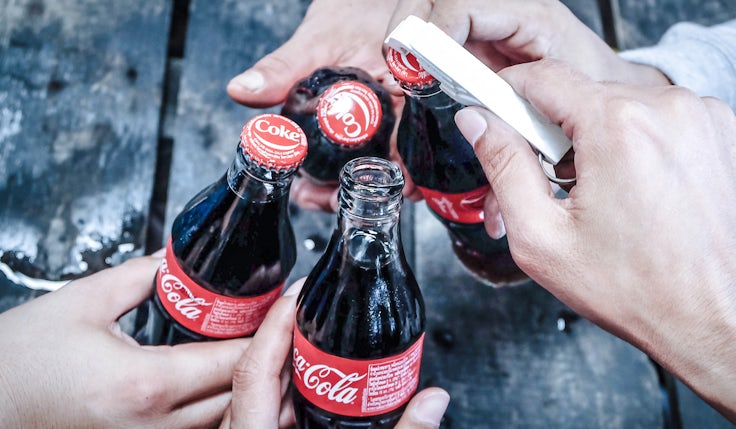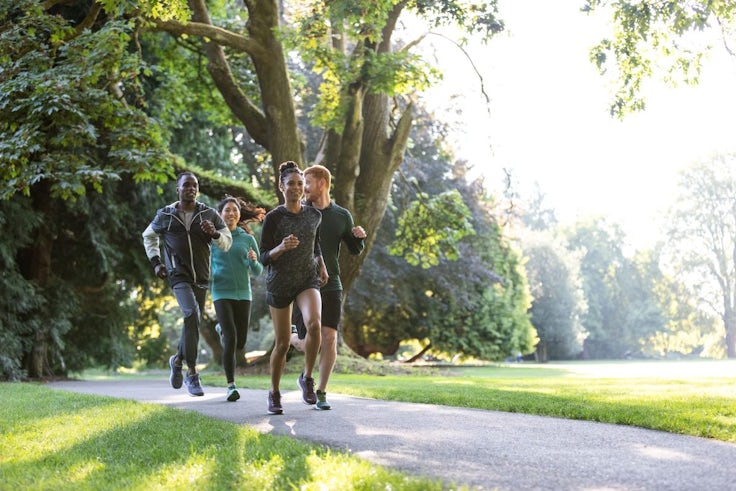Coca-Cola, Ladbrokes, Parkrun: 5 things that mattered this week and why
From Ladbrokes and Coral’s rebrand to Parkrun signing its first sports brand as a sponsor and Coca-Cola changing attitude to innovation, here’s all the biggest news from the marketing world this week.
Parkrun signs up its first sports brand as sponsor
The sight of hundreds of runners converging on parks on a Saturday morning is a common sight across the UK. Many are there to take part in a Parkrun, whether they are trying to hit a new personal best or jogging while chatting with friends.
It’s this inclusive approach to running (and the fact that taking part is free) that has fuelled the success of Parkrun. And it should be of little surprise that brands have wanted to piggyback on that popularity.
However, Parkrun is notoriously selective when it comes to bringing partners on board. Until now just five brands have sponsored the organisation, and it is quite an eclectic bunch including Persil, The Happy Egg Co. and Alzheimer’s Research UK. There wasn’t a sports brand in sight.
That was deliberate, according to Parkrun CEO Nick Pearson, who admits Parkrun had previously “dismissed” sports brands because of their focus on elite athletes. However, it has now signed up its first sports brand in Brooks Running, which has more of a focus on grassroots running and a ‘Run Happy’ brand positioning that chimes with Parkrun’s focus on the physical and mental benefits of running.
While sport’s biggest athletes and most successful teams will always attract brands’ investment, there is a growing realisation that more impact can be had if companies look at grassroots sport too. Brooks Running plans to help people understand more about running gear and its technical aspects, while also highlighting reasons why people run. That only seems like a good brand and business strategy.
Most gambling ads are ‘disposable’
Most ads for gambling brands use “disposable” creative developed by people who have never worked outside the sector, according to Ladbrokes and Coral managing director Dominic Grounsell. The brands are relaunching in a bid to stand out from their vanilla rivals.
“The transactional nature of the advertising in the category often means the ads become throwaway. You’re just moving from one offer-based mechanic to another,” says Grounsell.
Ladbrokes Coral has appointed BBH to kickstart the repositioning process, with big budget ads that focus on the passion that gamblers have for their habit, and for the sports they are betting on. With an ambition to make “great ads that just happen to sell gambling,” Ladbrokes and Coral have started with films that celebrate horse racing and have aired in time for the races at Cheltenham.
Coral will focus on passion, while ‘for-the-nation’ Ladbrokes will reflect the social currency that customers perceive from betting with the brand. Both brands will recognise that the sports and gambling sector is, at its heart, all about entertainment.
READ MORE: ‘Most gambling ads are disposable’ – Why Ladbrokes and Coral are relaunching their brands
Three launches biggest ever brand campaign
Most people in the UK don’t even have 5G network in their area, let alone a 5G phone that would work on that network, but that has not stopped mobile operators shouting about the benefits of the 5G future.
The latest to do so is Three, which is launching its biggest ever brand campaign to promote the fact it has the biggest 5G network in the UK. This being Three, though, it doesn’t focus on speed or megabits but on the benefits of technology – from faster download speeds to driverless cars and remote surgery, all done with tongue firmly in cheek.
Three’s CMO Shadi Halliwell has a tough job to do taking on its big network rivals, which all have much bigger marketing budgets. Instead, her strategy is to stand out by being bold and creative, adopting an always-on approach, and positioning Three as more of a fashion brand than a utility.
That includes this new campaign but also a sponsorship of Chelsea football club that will should help boost brand awareness and position Three as more premium.
READ MORE: ‘We are going for it’: Three launches its biggest brand campaign
Coca-Cola reorganises innovation by ‘instinct’
 Coca-Cola’s rapid innovation has caught the eyes of investors, rivals and consumers alike but now the soft drinks giant is slowing it down to nurture its current products.
Coca-Cola’s rapid innovation has caught the eyes of investors, rivals and consumers alike but now the soft drinks giant is slowing it down to nurture its current products.
This is a smart move from the brand that has been pumping out innovations at a rate of knots. Now it it needs to establish products like Coke’s Signature Mixers and leveraging marketing to build up their profile.
The company’s Western Europe marketing director Walter Susini says innovations are like children that the brand need to nurture with no plans to bring anymore products to market until they can at least “go to school”.
It is unsurprising that, despite this stall on innovation, Coke is still keeping its eyes peeled for future endeavours. The company has changed the way it groups innovation in Europe, however, where it is looking at ‘instinct’ instead of brands. This means marketers try to attach a consumer demand or feeling (such as being energised, social, or to relax) and then retrospectively apply this to the appropriate brand.
The new approach is aimed at solving modern marketing problems, according to Susini, who is passionate about “getting out of the cage of the brand” and adapting to blurring category lines.
READ MORE: Why Coca-Cola is getting ‘out of the cage of the brand’ to foster innovation
Aldi returns to campaign that made it famous
Proof that once you have a good marketing recipe you should probably stick to it, Aldi has launched a refreshed version of its ‘Like Brands, Only Cheaper’ campaign starring Jean, who is still rather fond of a tipple. Aldi’s own-brand gin tipple, to be precise.
It’s been nine years since Jean made her TV debut in what turned out to be a pivotal brand campaign for Aldi, earning the German discount supermarket not only a long-term place in the UK grocery market, but also Marketing Week’s campaign of the decade.
Aldi’s decision to go back to the campaign that made it famous is testament to the power of a strong brand campaign. That it launched the ad during ITV’s Coronation Street is yet further testament to the unrivalled effectiveness of TV and media that can make a big impact at scale.
Aldi has also debuted a bespoke soundtrack centred around its ‘Everyday Amazing’ strapline, which shows the supermarket is thinking about how it can build its brand and salience in new ways.
At the end of the day, it’ll be the job of the Kantars and Nielsens to show whether this has any impact on Aldi’s share of the UK grocery market.
It’s all very well making ads that people like, but in an ever-competitive grocery sector it’s sales and share that matter.
READ MORE: Aldi brings back Jean for new marketing campaign







